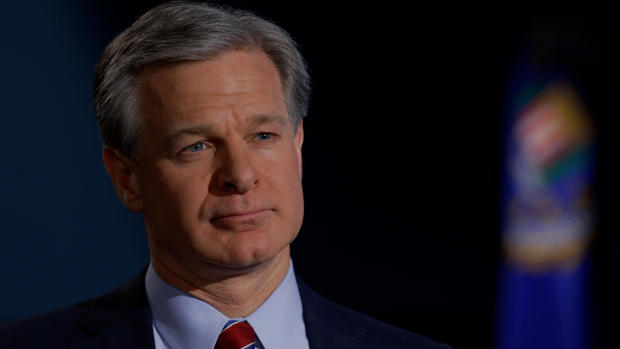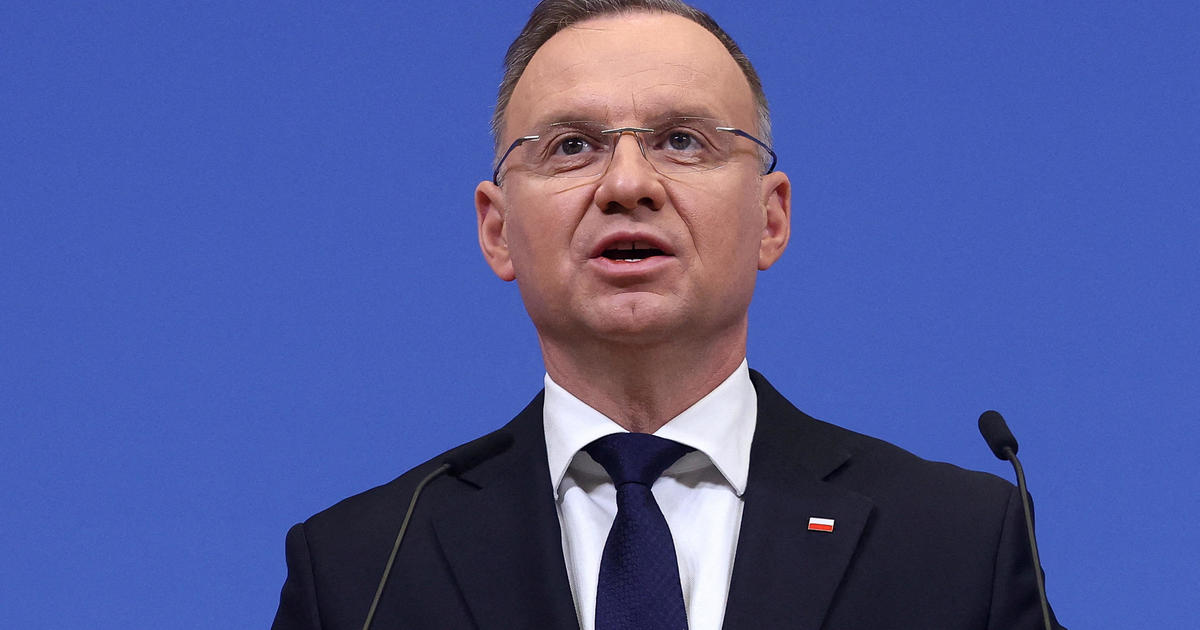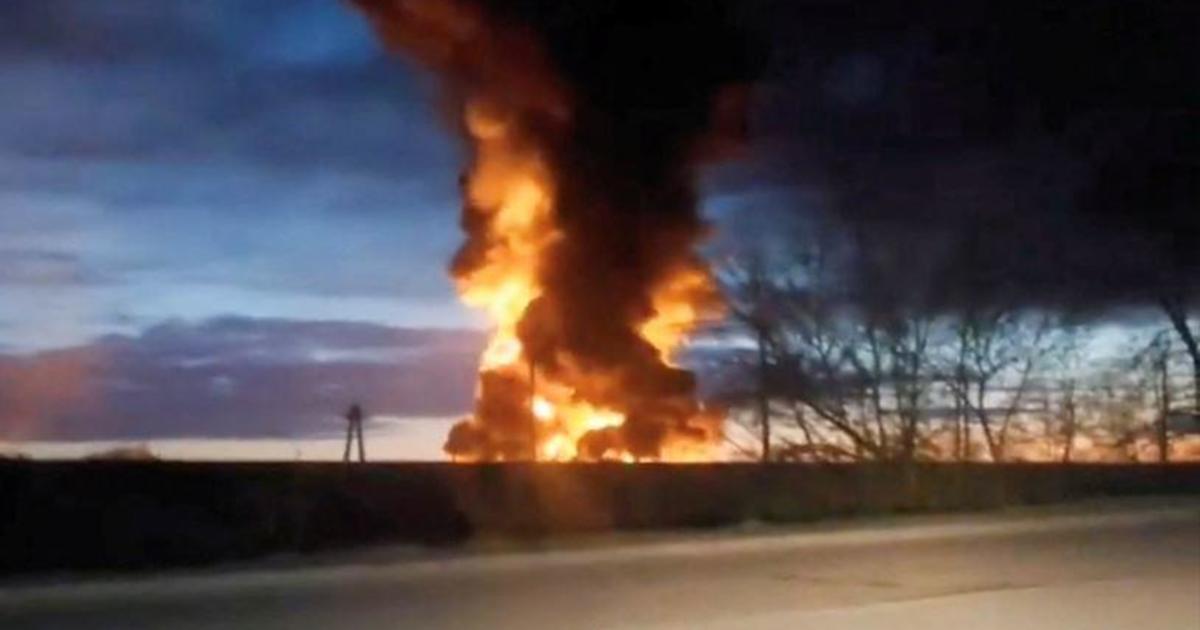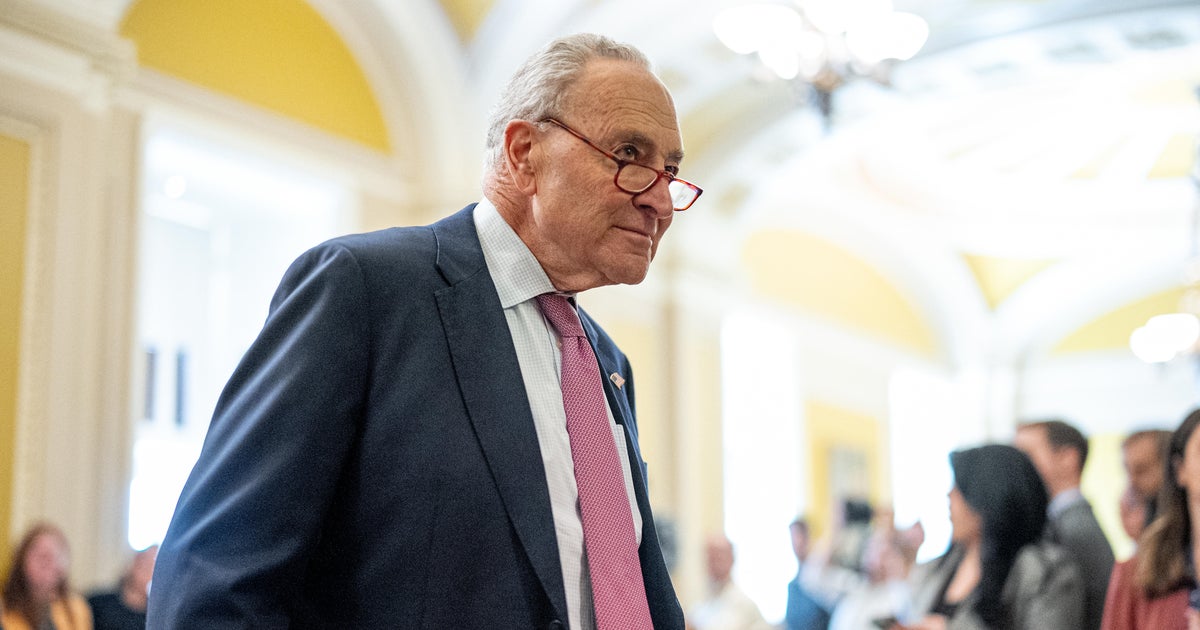FBI Director Christopher Wray on foreign cyberattacks, domestic terrorism and attacks on law enforcement
The FBI is engaging the war in Ukraine with an around-the-clock cyber defense against Russian military hackers. In a rare interview, FBI Director Christopher Wray told us how the bureau is engaging that war while fighting rising violence at home, terrorism abroad, and the unprecedented scale of theft by China. It's a lot to take on. Wray leads 35,000 men and women worldwide with the dual missions of fighting crime and counterespionage. We spoke, this past Thursday, at FBI headquarters in Washington and started with the bureau's cyber defense of Ukraine.
Scott Pelley: You have put the FBI on a war footing?
Christopher Wray: In effect, we have. We view this as combat posture, with respect to cyber activity.
Scott Pelley: your orders are to help Ukraine keep the lights on, keep the communications flowing, and keep their critical infrastructure from being taken down?
Christopher Wray: My instruction to our folks is to lean in, to lean forward, to be as helpful to them as we possibly can be to help them anticipate, prevent, defend, mitigate malicious Russian cyber activity.
Scott Pelley: Has Russia increased cyber-attacks on the United States since the Ukraine invasion?
Christopher Wray: I'm not sure I would say they've increased it, but certainly they've continued what they've been doing for years. And the prospect of that becoming more destructive and more severe is something that we're keenly watching for. So, we're treating it as sort of combat tempo. We have a 24/7 cyber command post running, and we've had now for several weeks. We've been pushing out intelligence products to private companies and others. We've been pushing out technical information to network defenders at a lotta these companies.
In March, Wray's FBI defeated Russian military malware discovered on networks in the U.S. And around the world. The malware, prepared and laid in advance, was waiting to be activated. But the FBI electronically severed Russia's connection with its cyberweapon.
Christopher Wray: And I can't get too specific about it here, but where we see a lotta those same sorts of activities, scanning, probing, preparation-- you know, trying to develop access. And so, the key is to work closely with partners, whether it's the Ukrainians when it's their critical infrastructure, whether it's private companies here in the United States to try to make sure that we're interrupting and disrupting that before it becomes more damaging and destructive.
Wednesday, we followed Chris Wray to his morning briefing.
We joined the unclassified part which was, essentially, "good morning" and Wray asking, "whadda we got?"
Christopher Wray: On any given morning I'm gonna be hearing about say a domestic terrorist trying to blow up a hospital in the middle of a pandemic or an ISIS-inspired subject who's trying to blow up a synagogue or, you know, our cyber agents racing out to a children's hospital to prevent them from falling prey to a looming ransomware attack.
Scott Pelley: Why did you take this job? You have to be right 100% of the time.
Christopher Wray: I realize that this is not a job for the faint of heart. And I can assure the American people that I am not faint of heart. I was inspired to come back and take on this job because I believe deeply in the work, the mission of protecting American people and upholding the Constitution, and the people of the FBI.
Christopher Wray is 55, married with two grown children. He graduated from Yale, and Yale Law. In the 90's he was a federal prosecutor in Atlanta. Over the years he rose to headquarters and led the Justice Department Criminal division. In 2005, he left for private practice but in 2017, after President Trump fired Director Jim Comey, wray was recruited. The Senate confirmation vote was a bipartisan landslide, 92 to five.
Scott Pelley: Let's switch for a moment from counterintelligence to crime fighting. In 2020, there was a 29% jump in murder in the United States, nearly 5,000 more people killed than the year before. What is behind this leap in homicide?
Christopher Wray: Certainly the pandemic didn't help. There's a variety of ways in which that contributed to it. We're seeing more and more juveniles committing violent crime, and that's certainly an issue. We're seeing a certain amount of gun trafficking, interstate gun trafficking. That's part of it. And we're seeing an alarming frequency of some of the worst of the worst getting back out on the streets.
Scott Pelley: In 2021, there was a 59% increase in the murders of police officers, 73 officers killed.
Christopher Wray: Violence against law enforcement in this country is one of the biggest phenomena that I think doesn't get enough attention. Last year, officers were being killed at a rate of almost one every five days.
Scott Pelley: But why are more officers being killed right now?
Christopher Wray: Some of it is tied to the violent crime problem as a whole. But one of the phenomena that we saw in the last year is that an alarming percentage of the 73 law enforcement officers killed in the line of duty last year were killed through things like being ambushed or shot while out on patrol.
Scott Pelley: They were killed because they were police officers.
Christopher Wray: Right. Wearing the badge shouldn't make you a target.
Wray lost two agents last year. Laura Schwartzenberger and Daniel Alfin were shot while executing a search warrant in a child pornography case.
Christopher Wray: I heard about Laura and Dan's murders within really moments of it happening, from our Miami Field Office. And I was on the phone with their spouses within a few hours. And I was in their living rooms the next morning. And my reaction was a feeling of ache, almost sickness, inside-- in my distress. you know, it's the hardest thing I've encountered in this job.
Scott Pelley: Can you say you're making any headway in violent crime?
Christopher Wray: We are working very hard with our partners, state and local law enforcement partners, through task forces, task forces all over the country. And through surging rapid deployment teams to try to combat violent crime in specific hot spots. Last year I think we arrested something like 15,000 violent gang members around the country. And part of what fuels us to pursue this mission is our deep conviction that law enforcement's most sacred duty is to ensure that people can live free from fear in their own homes and neighborhood's.
Scott Pelley: But Mr. Director, some people are in their homes living in fear of the police coming through the door with a no-knock warrant. And I wonder how the FBI can contribute to the reduction of police brutality, which also occurs in our country?
Christopher Wray: Well, we take very seriously our responsibility to both protect the American people and uphold the Constitution. And that includes where it happens, going after police misconduct if it violates federal criminal law
Perhaps the greatest controversy on Chris Wray's watch was the attack on the Capitol. The bureau has been criticized for failing to develop intelligence that might have predicted the assault.
Christopher Wray: Over 800 people have now been charged. Agents in field offices all over the United States engaged in it. And we take this incredibly seriously--
Scott Pelley: But what you'd like to have is prevention.
Christopher Wray: Our goal is to prevent terrorist attacks of any kind, domestic or international.
Scott Pelley: The criticism of the FBI after January 6th was that the plans of these people were on social media and the FBI didn't see that.
Christopher Wray: We at the FBI shared information through a variety of intelligence products for a solid year leading up to January 6th that raised the potential for violent extremism What we did not, to my knowledge, have was intelligence indicating that thousands of people were going to physically storm the U.S. Capitol in the middle of the constitutional process.
Scott Pelley: What did you learn?
Christopher Wray: You can bet we have been taking a hard look at how we can be even more preemptive, even more aggressive, even more responsive to make sure that we prevent something like that from ever happening again. And you can be sure, Americans can be sure, the FBI is fiercely determined to do our part with the other agencies to make sure that that never happens again.
Scott Pelley: One of the things you learned was that these militia groups can organize and mobilize.
Christopher Wray: And that's part of a broader phenomenon that we've seen over the last couple of years, of a variety of anti-government, anti-authority violent extremists. But a lot of the domestic terrorist threat that we face is not from well-organized, structured, traditional groups. In many ways, the hardest, biggest threat, terrorist threat that Americans face here in the homeland, is from what are essentially lone actors or people conspiring with one or two other people and using crude attack methods, a gun, a knife, a car So, if you think about the expression that a lot of Americans have heard about connecting the dots, for the kind of attack I'm describing, there are not a lotta dots to connect.
Wray works to connect the dots from headquarters with a $10 billion annual budget, 56 U.S. field offices and more than 90 offices abroad.
Scott Pelley: In counterintelligence, does anything worry you more than Russia?
Christopher Wray: The biggest threat we face as a country from a counter-intelligence perspective is from the People's Republic of China, and especially the Chinese Communist Party. They are targeting our innovation, our trade secrets, our intellectual property on a scale that's unprecedented in history. They have a bigger hacking program than that of every other major nation combined. They have stolen more of Americans' personal and corporate data than every nation combined. It affects everything from agriculture to aviation to high tech to healthcare, pretty much every sector of our economy. Anything that makes an industry tick, they target.
Scott Pelley: What is the FBI doing about that?
Christopher Wray: We are now moving at a pace where we're opening a new China counter-intelligence investigation about every 12 hours. There's well north of 2,000 of these investigations. All 56 of our field offices are engaged on it. And I can assure you that it's not because our agents don't have enough else to do. It's a measure of how significant the threat is.
Christopher Wray is not quite halfway through his 10-year term. That means, by our count, nearly 1,400 more perfectly good mornings spoiled by that classified briefing.
Scott Pelley: Do you go to bed at night and ask yourself, "What did we miss?"
Christopher Wray: I'm always wondering about the-- as I think Secretary Rumsfeld famously said, "the unknown unknown." And that's probably the one thing that I worry about the most.
Scott Pelley: What is the best guarantee you can make to the American people?
Christopher Wray: I can't guarantee outcomes. What I can do is promise that I will try everything I can to make sure that we do the work in the right way-- that our process has integrity, has rigor, has objectivity-- that we bring those qualities to the work-- and that we will follow the facts wherever they lead, to whomever they lead, no matter who likes it.
Produced by Aaron Weisz and Pat Milton. Associate producer, Ian Flickinger. Broadcast associate, Michelle Karim. Edited by Craig Crawford.





